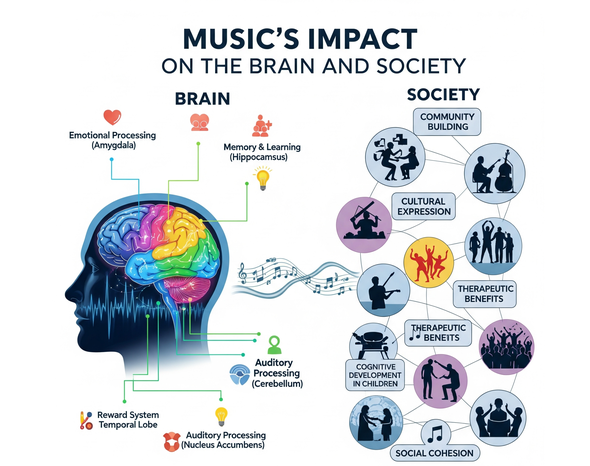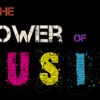AD
The universal language of music is more than just a form of entertainment; it is a fundamental aspect of the human experience that deeply influences both our individual minds and the fabric of our societies. From the rhythmic chanting of ancient ceremonies to the complex symphonies of modern concert halls, music has the unique ability to transcend cultural barriers and connect with us on a primal level. This profound influence stems from its dual role as a powerful activator of the brain and a unifying force in society, shaping our emotions, memories, and collective identities.
Music’s impact on the human brain is both immediate and measurable. When we listen to a piece of music, our brains do not simply process sound; they engage in a complex symphony of neural activity. The auditory cortex is, of course, the primary recipient of the sonic information, but this signal quickly spreads to other critical areas. The limbic system, a network of brain structures responsible for emotion and memory, is particularly responsive to music, which explains why a single melody can instantly evoke powerful feelings or transport us back to a cherished memory. The release of dopamine in the brain’s reward pathways when we anticipate or hear a pleasing musical phrase further highlights its neurochemical power, making music a potent source of pleasure and motivation. Beyond mere enjoyment, music has been shown to enhance cognitive functions, with studies demonstrating that musical training can improve neuroplasticity, memory, and spatial reasoning skills, a testament to its profound and lasting effect on neural development.
The influence of music extends far beyond the individual, serving as a critical cornerstone of social and cultural life. Throughout history, music has been a vehicle for shared experience, creating a sense of unity and belonging within communities. It acts as a powerful reservoir of cultural identity, with traditional folk songs, ceremonial chants, and national anthems serving as a means to preserve history, values, and a collective sense of self. In this way, music transcends a simple art form and becomes a living history book, passed down through generations. Furthermore, music has consistently served as a powerful tool for social and political movements. From the protest songs of the civil rights era to the anthems of modern-day activists, music has the ability to articulate shared grievances, galvanize support, and inspire collective action, proving its strength as a force for social change.
In conclusion, the dual influence of music on the human brain and society is undeniable. On an individual level, it is a key that unlocks our emotional and cognitive potential, affecting our moods, enhancing our memories, and stimulating neural growth. On a collective level, it is a universal language that strengthens social bonds, preserves cultural heritage, and drives social progress. The enduring presence of music in every known human culture attests to its essential role in shaping who we are, both as individuals and as a global community.
BY OURTOWNRADIO
AD


















Post comments (0)